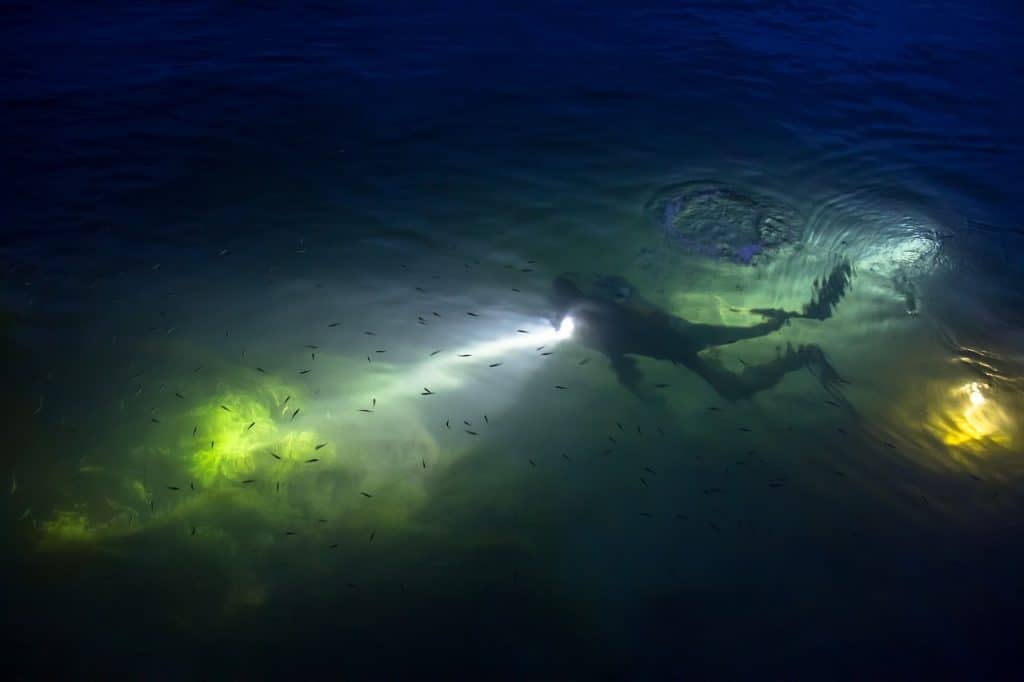

If you think scuba diving at daytime is exciting, wait until you try night diving. Descending under the waves in the cover of darkness is a thrilling and mysterious experience because it transforms the way you normally see marine life in the presence of light. Night diving is incomparable to other forms of diving because once you slip beneath the waters at night, you’ll discover a more colorful and ethereal marine realm. To enjoy night diving, you need to have Advanced Open Water Certification.
Here are some tips to make your night diving experience fun, exciting, safe, and memorable.
It is advisable to go night diving at a site that you have already explored during daytime since a familiar location makes navigation easier. It also enables you to compare the marine life activities that you have witnessed during daytime with the underwater life scenes at night.
Prior to the night dive, make sure that your scuba gear fits properly and test if your primary torchlight and backup light (usually smaller than the primary light to stow easily) are functioning well by turning them on and off before jumping in the water. Your backup light is equally important because if your primary light fails, you still have another one to rely on.

You can begin your night dive before sunset so that you still have a fair amount of light to gear up with ease. Starting off at dusk allows you to witness the light transform beneath the surface and see how the behavior of marine critters change from day to night. You can observe daytime dwellers settling into the night and nocturnal creatures like crustaceans, sharks, and rays waking up from their slumber to begin their night hunt. Dusk is also a great time to observe other marine animal behaviors like courting, mating, and spawning. Taking your plunge before the sun goes down can also lessen the stress of the dive, especially for a first time night diver.
You don’t have to go far and deep to enjoy the benefits of night diving especially if you’re a newbie. Depth and visibility are not big factors in night diving compared to plunging in the waters during the day since you only get to see whatever is illuminated by your torch beam. You can already appreciate the vivid colors of marine life even at shallow depths because you control the light source.
Night diving is not a marathon so there is no need to rush. It is better to take your time descending so you could observe the different marine creatures in their natural habitat especially the small critters that venture out at night to mingle and feed.
Your dive buddy is your partner underwater and it is your responsibility to keep a close eye on one another. Avoid losing sight of your dive partner by keeping him/her close within a few meters but at the same time giving each other ample space to move and explore with ease.
Night diving communication may be a little more complicated than daytime diving due to the dark environment. Before the dive, it is highly suggested that you go over various hand signals with your dive buddy and agree on the important ones that you will use. You can either shine your torch on your hands when making hand signals in order for your buddy to see the message that you are relaying or create signals using your light. For instance, you can use your light to signal “OK”, “Yes”, or “No” by moving your light up, down, in a circular motion, or side to side. Ensure that you and your buddy understand what light motion is attributed to a specific signal to avoid confusion in the water. You can also agree on a type of signal to get each other’s attention such as circling of the light. It is a good idea to practice hand and light signals before the actual dive to master them by heart.
Be very careful when aiming your torchlight during a night dive. Avoid shining your light directly into the eyes of another diver because it can negatively affect his night vision.

As a diver, it is your responsibility to respect marine creatures of all shapes and sizes and avoid causing them undue stress. Take extra precaution not to disturb marine life with your torch because the light can suddenly awaken sleeping underwater creatures and cause confusion, disorientation, and even increase their heart rate. The best thing you can do is to always pay attention to where you are aiming your torchlight.
Your dive boat should be marked with a flashing strobe light to help you and fellow divers find your way back. When making your ascent, you can shine your light towards the surface to safely return to the boat and avoid hitting the hull.
Relax and have a breathtaking and fascinating time exploring the underwater world at night. Explore new dimensions and enjoy the experience of diving with marine creatures that you don’t get to see during the day.
It’s natural to feel a little anxious about diving at night and these tips can help you overcome your doubts and worries about making a descent in the darkness. Night diving unravels an alluring world like no other and once you try it, you will likely want more.
What are you waiting for? Come and experience Night Diving in Fujairah and discover the unique beauty of the sea at night with your dive light.
Experiences
Find the perfect escape
© 2024 NEMO DIVING CENTER
Scuba diving is an exciting and adventurous water sport that offers a chance to explore the beauty of the underwater world and its amazing marine life. The UAE, particularly Dubai, is one of the most popular destinations for scuba diving, attracting divers from all over the world. With its crystal clear waters and diverse marine life, scuba diving in Dubai offers a unique and unforgettable experience.
The cost of scuba diving in Dubai varies depending on the dive center you choose and the type of dive you opt for. On average, a single dive can cost anywhere from AED 250 to AED 550, with the average price for a single dive being around AED 350. This price usually includes all the necessary equipment, such as the dive tank, regulator, and wetsuit, as well as the services of a professional dive guide. At Nemo Diving Center, We offer a wide range of diving packages to suit every budget and experience level.
Diving in Dubai is an incredible experience, and the UAE is home to many dive sites teeming with amazing marine life including colorful soft and hard corals, sea turtles, stingrays, manta rays, moray eels, cuttlefish, octopus, nudibranchs, seahorses, and a plethora of fish species. It is also noted for its incredible dive wrecks that have become rich artificial reefs. These dive sites offer a unique and exciting diving experience, providing a chance to explore sunken ships and other structures that have become havens for marine life.
Come and explore the unique underwater world of Palm Jumeriah in Dubai and incredible dive sites in Fujairah such as Dibba Rock, Sharm Rock, Martini Rock, Snoopy Island, and more. At Nemo Diving Center, we offer dive trips to these amazing dive sites, allowing divers to discover the incredible marine life that has made the wreck its home. We also offer a wide range of other dive sites to choose from, including shallow coral reefs, deep wrecks, and drift dives, providing something for every level of diver.
In conclusion, scuba diving in Dubai offers an unforgettable experience for all levels of diver. With its clear waters, diverse marine life, and incredible dive sites, Dubai is a must-visit destination for any scuba diver. Whether you’re a beginner or an experienced diver, our team at Nemo Diving Center will ensure that you have an amazing time exploring the beauty of the underwater world.
Click one of our contacts below to chat on WhatsApp
Social Chat is free, download and try it now here!
